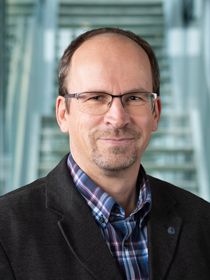How must supply chains look like in the future to ensure the availability of medical products in crises? Jürgen Peukert, lecturer at Danube University Krems and Senior Client Partner at Korn Ferry, holds seminars on challenges and solutions for the design of supply chains, emphasizing the importance of training managers in this area.
Bottlenecks that led to shortages in various supply chains of medical materials, laboratory materials or medicines due to COVID-19 were also discussed in the public. In the past, manufacturing was often relocated to East Asian countries for cost reasons. Due to the impact of COVID-19, manufacturing products or active ingredients was only possible to a limited extent and the worldwide distribution met restrictions, all of this resulting in supply shortages in the markets and for patients. "The pandemic triggered new considerations how to ensure the security of supply in the future. Resilience has become the 'credo': In many cases, this requires targeted investments. For example, parallel and flexible production facilities could be set up, alternative routes developed or safety stocks established. Our goal is, of course, that patients are not affected by bottlenecks," says the expert in transformation management and organizational development.
Since 2010, Jürgen Peukert has been preoccupied with supply chains as part of the "Biotech, Pharma & MedTech Management" specialization of the "Professional MBA" course at Danube University Krems.
"Further changes with a high impact are to be found in new innovation thrusts, for example in gene and cell therapy. The entire supply chain is not comparable to the traditional models and forms of organization. The same applies to the use of new information technologies, such as artificial intelligence. With their help, the planning and control of the supply chain can be fundamentally redesigned. As a result, new capabilities and organizational models develop. People who work in this area must gain a basic understanding of the processes and understand future changes and develop solution competence," says Jürgen Peukert.
Clinical studies, fake products and new forms of therapy
The pandemic also has an impact on clinical trials. "It takes on average about twelve years and costs well over one billion euros to get a drug to market approval. Interruptions in the course of studies due to disruptions in the supply chains as well as in the access of study participants to the trial centers have an impact on the timing of clinical studies and can delay the market launch," Peukert further. Therefore, there are consequences for the access to new forms of therapy as well as the innovative ability of companies.
"To identify fake products more quickly, authentication measures are being developed and implemented," explains the expert for transformation management and organizational development.
In difficult situations, creativity helps develop solutions: "Companies have joined forces across industries and according to their core competencies and developed ventilators especially for use in the COVID 19 pandemic. In cooperation with the authorities, procedures were accelerated for the approval of these medical innovations. The processes of the supply chain thus adapt to changing ecosystems and general conditions. To solve all these problems, we have to provide managers with the right tools," Peukert explains.
Training of professionals necessary
Students of the MBA specialization "Biotech, Pharma & MedTech Management" at Danube University Krems deal with these questions. The course is divided into twelve general management and three specialization subjects. The second year of study is oriented towards the industry, and the lecturers impart knowledge in the areas of Quality and Regulations, Innovation & Market Access and Digitalization & New Business Models. These modules can also be booked individually. "Our students work in the fields of biotechnology, medicine, the pharmaceutical industry and medical technology or are entrepreneurs in the life sciences. In most cases, they strive for management positions or want to start their own company," explains Assistant Prof Jens Hartmann from the Center for Biomedical Technology. The university course is a cooperation with partners from Germany and Italy, where part of the specialization subjects are also taught. Start of the next course will be online in winter semester 2020/21. However, on-campus modules are planned to take place as soon as this is possible. "For us, it is very important that the students can build a network and exchange ideas. As soon as circumstances allow, we will teach in classroom again," says Jens Hartmann, the expert in medical process engineering.
